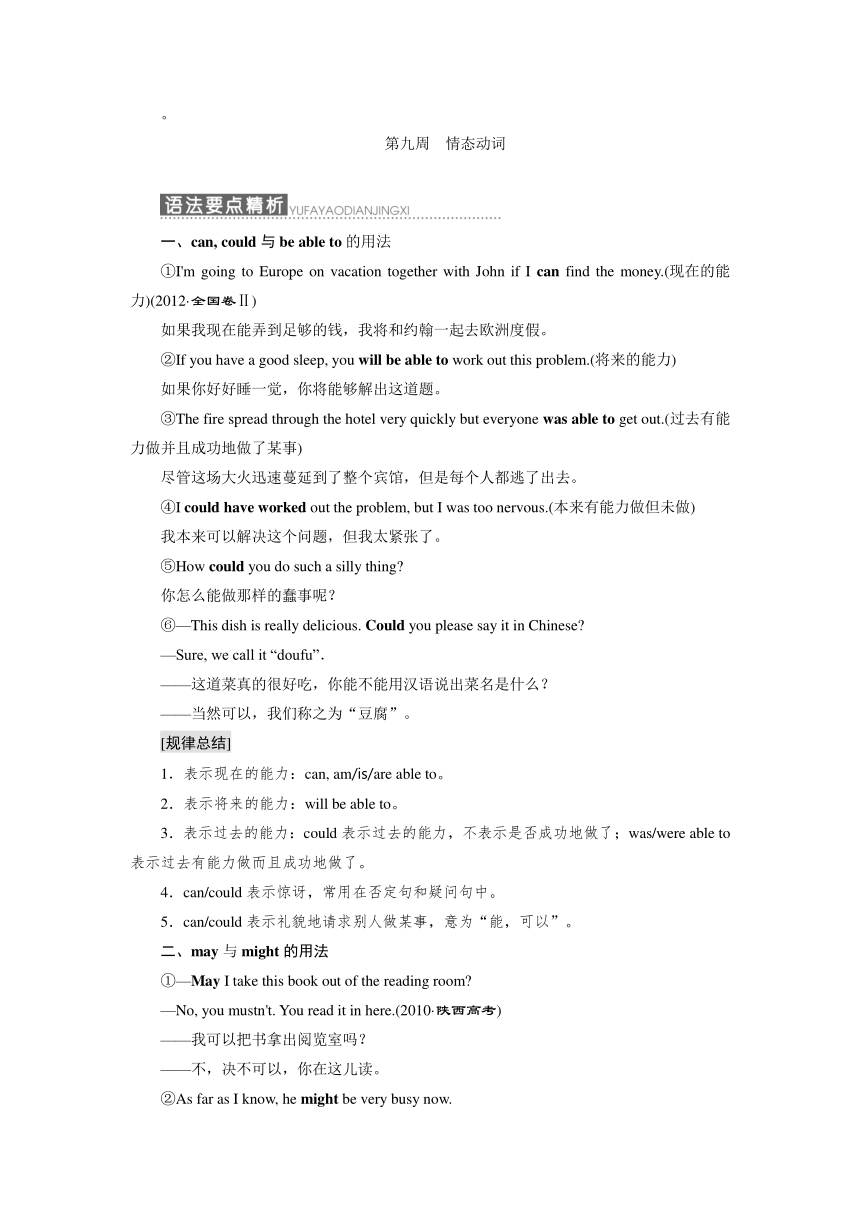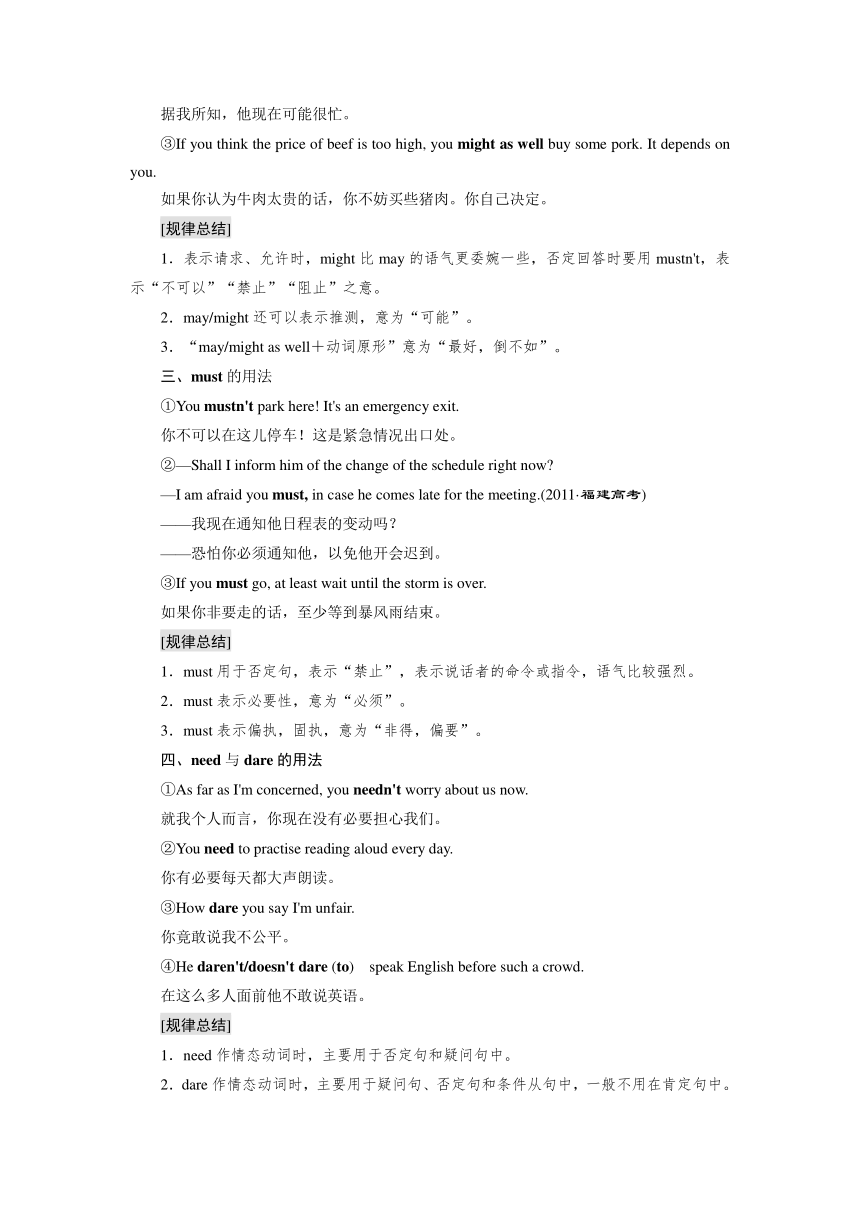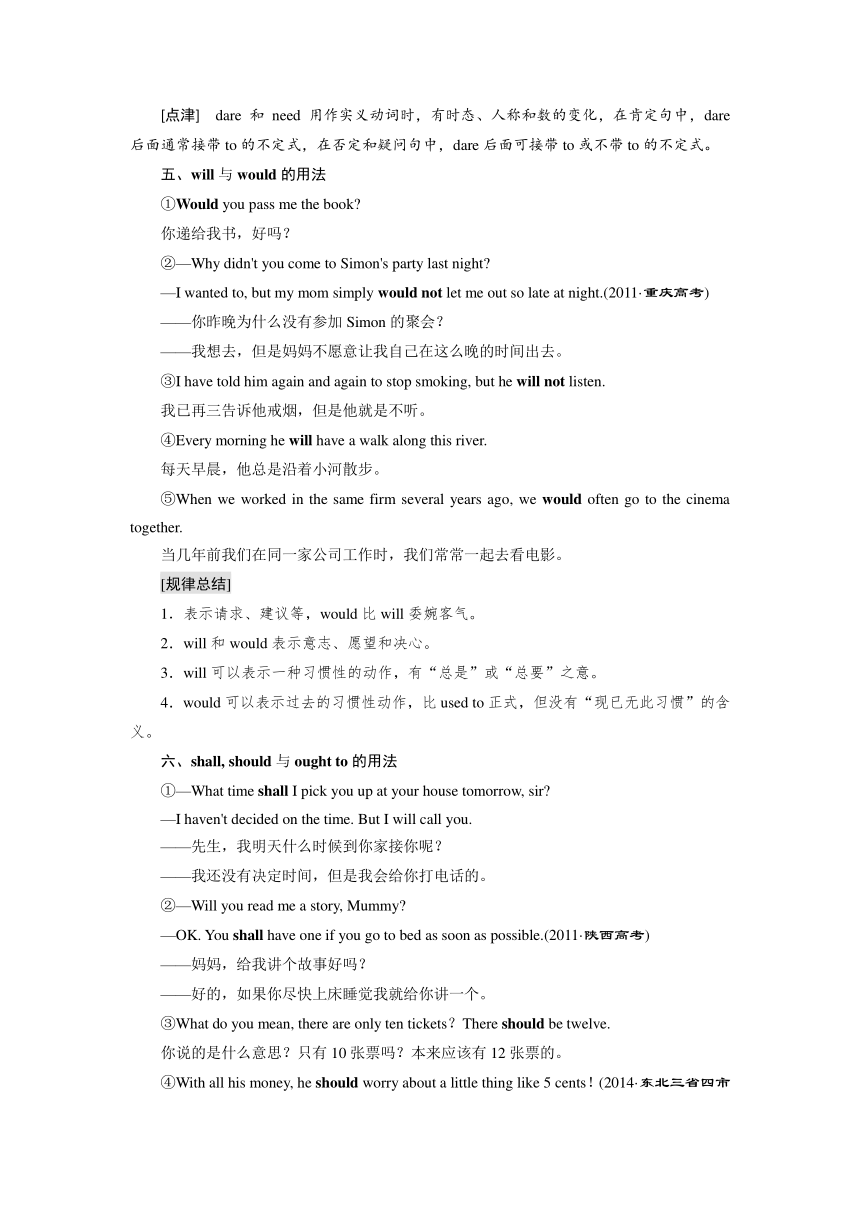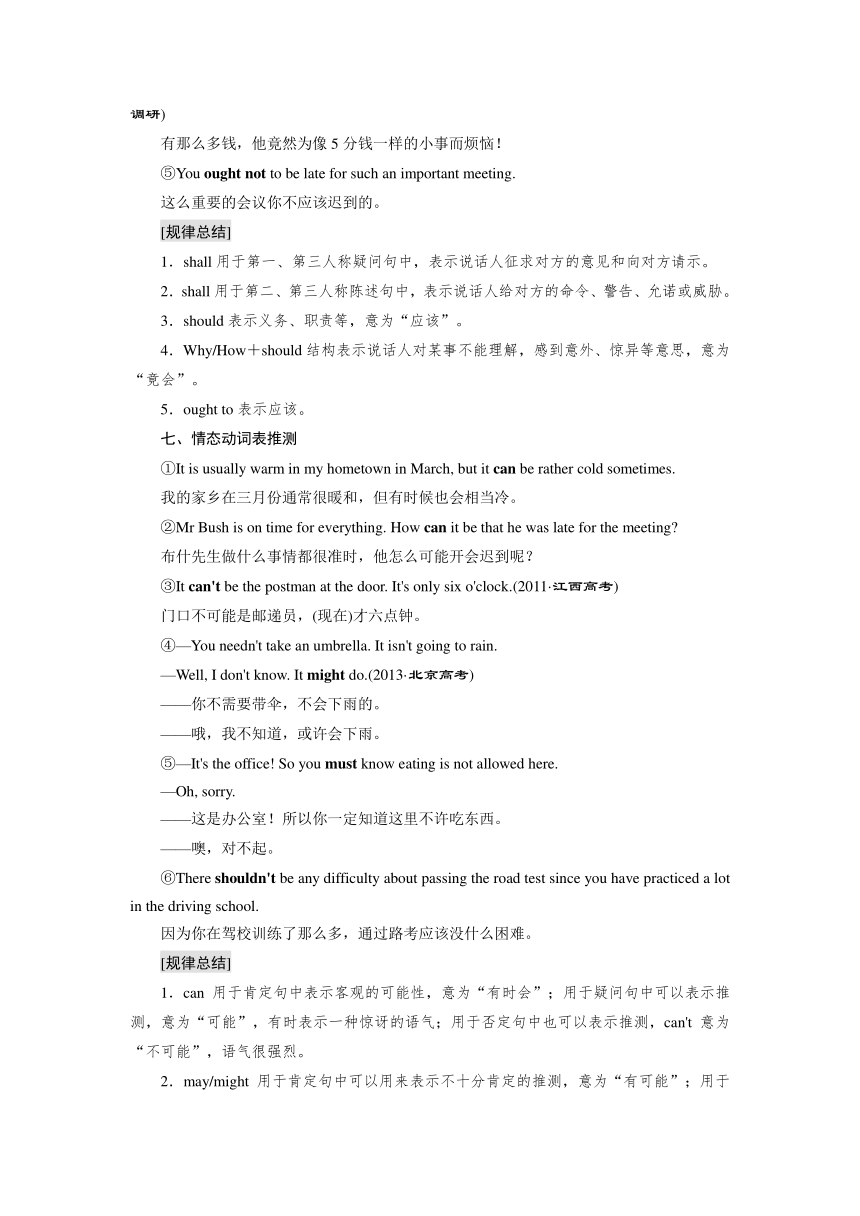【每周一讲,个个击破】2015《三维设计》高考英语(江苏专用)大一轮语法专题:第九周 情态动词(语法要点精析+高频考点领悟+专题过关检测)
文档属性
| 名称 | 【每周一讲,个个击破】2015《三维设计》高考英语(江苏专用)大一轮语法专题:第九周 情态动词(语法要点精析+高频考点领悟+专题过关检测) |  | |
| 格式 | zip | ||
| 文件大小 | 77.0KB | ||
| 资源类型 | 教案 | ||
| 版本资源 | 通用版 | ||
| 科目 | 英语 | ||
| 更新时间 | 2014-07-24 07:36:42 | ||
图片预览




文档简介
。
第九周 情态动词
一、can, could与be able to的用法
①I'm going to Europe ( http: / / www.21cnjy.com ) on vacation together with John if I can find the money.(现在的能力)(2012·全国卷Ⅱ)
如果我现在能弄到足够的钱,我将和约翰一起去欧洲度假。
②If you have a good s ( http: / / www.21cnjy.com )leep, you will be able to work out this problem.(将来的能力)
如果你好好睡一觉,你将能够解出这道题。
③The fire spread thro ( http: / / www.21cnjy.com )ugh the hotel very quickly but everyone was able to get out.(过去有能力做并且成功地做了某事)
尽管这场大火迅速蔓延到了整个宾馆,但是每个人都逃了出去。
④I could have ( http: / / www.21cnjy.com ) worked out the problem, but I was too nervous.(本来有能力做但未做)
我本来可以解决这个问题,但我太紧张了。
⑤How could you do such a silly thing
你怎么能做那样的蠢事呢?
⑥—This dish is really delicious. Could you please say it in Chinese
—Sure, we call it “doufu”.
——这道菜真的很好吃,你能不能用汉语说出菜名是什么?
——当然可以,我们称之为“豆腐”。
1.表示现在的能力:can, am/is/are able to。
2.表示将来的能力:will be able to。
3.表示过去的能力:could表示过去的能力,不表示是否成功地做了;was/were able to表示过去有能力做而且成功地做了。
4.can/could表示惊讶,常用在否定句和疑问句中。
5.can/could表示礼貌地请求别人做某事,意为“能,可以”。
二、may与might的用法
①—May I take this book out of the reading room
—No, you mustn't. You read it in here.(2010·陕西高考)
——我可以把书拿出阅览室吗?
——不,决不可以,你在这儿读。
②As far as I know, he might be very busy now.
据我所知,他现在可能很忙。
③If you think the p ( http: / / www.21cnjy.com )rice of beef is too high, you might as well buy some pork. It depends on you.
如果你认为牛肉太贵的话,你不妨买些猪肉。你自己决定。
1.表示请求、允许时,might比may的语气更委婉一些,否定回答时要用mustn't,表示“不可以”“禁止”“阻止”之意。
2.may/might还可以表示推测,意为“可能”。
3.“may/might as well+动词原形”意为“最好,倒不如”。
三、must的用法
①You mustn't park here! It's an emergency exit.
你不可以在这儿停车!这是紧急情况出口处。
②—Shall I inform him of the change of the schedule right now
—I am afraid you ( http: / / www.21cnjy.com )must, in case he comes late for the meeting.(2011·福建高考)
——我现在通知他日程表的变动吗?
——恐怕你必须通知他,以免他开会迟到。
③If you must go, at least wait until the storm is over.
如果你非要走的话,至少等到暴风雨结束。
1.must用于否定句,表示“禁止”,表示说话者的命令或指令,语气比较强烈。
2.must表示必要性,意为“必须”。
3.must表示偏执,固执,意为“非得,偏要”。
四、need与dare的用法
①As far as I'm concerned, you needn't worry about us now.
就我个人而言,你现在没有必要担心我们。
②You need to practise reading aloud every day.
你有必要每天都大声朗读。
③How dare you say I'm unfair.
你竟敢说我不公平。
④He daren't/doesn't dare (to) speak English before such a crowd.
在这么多人面前他不敢说英语。
1.need作情态动词时,主要用于否定句和疑问句中。
2.dare作情态动词时,主要用于疑问句、否定句和条件从句中,一般不用在肯定句中。
[点津] dare和need用作实 ( http: / / www.21cnjy.com )义动词时,有时态、人称和数的变化,在肯定句中,dare后面通常接带to的不定式,在否定和疑问句中,dare后面可接带to或不带to的不定式。
五、will与would的用法
①Would you pass me the book
你递给我书,好吗?
②—Why didn't you come to Simon's party last night
—I wanted to, but my m ( http: / / www.21cnjy.com )om simply would not let me out so late at night.(2011·重庆高考)
——你昨晚为什么没有参加Simon的聚会?
——我想去,但是妈妈不愿意让我自己在这么晚的时间出去。
③I have told ( http: / / www.21cnjy.com )him again and again to stop smoking, but he will not listen.
我已再三告诉他戒烟,但是他就是不听。
④Every morning he will have a walk along this river.
每天早晨,他总是沿着小河散步。
⑤When we wor ( http: / / www.21cnjy.com )ked in the same firm several years ago, we would often go to the cinema together.
当几年前我们在同一家公司工作时,我们常常一起去看电影。
1.表示请求、建议等,would比will委婉客气。
2.will和would表示意志、愿望和决心。
3.will可以表示一种习惯性的动作,有“总是”或“总要”之意。
4.would可以表示过去的习惯性动作,比used to正式,但没有“现已无此习惯”的含义。
六、shall, should与ought to的用法
①—What time shall I pick you up at your house tomorrow, sir
—I haven't decided on the time. But I will call you.
——先生,我明天什么时候到你家接你呢?
——我还没有决定时间,但是我会给你打电话的。
②—Will you read me a story, Mummy
—OK. You shall have ( http: / / www.21cnjy.com ) one if you go to bed as soon as possible.(2011·陕西高考)
——妈妈,给我讲个故事好吗?
——好的,如果你尽快上床睡觉我就给你讲一个。
③What do you mean, there are only ten tickets?There should be twelve.
你说的是什么意思?只有10张票吗?本来应该有12张票的。
④With all his money ( http: / / www.21cnjy.com ), he should worry about a little thing like 5 cents!(2014·东北三省四市调研)
有那么多钱,他竟然为像5分钱一样的小事而烦恼!
⑤You ought not to be late for such an important meeting.
这么重要的会议你不应该迟到的。
1.shall用于第一、第三人称疑问句中,表示说话人征求对方的意见和向对方请示。
2.shall用于第二、第三人称陈述句中,表示说话人给对方的命令、警告、允诺或威胁。
3.should表示义务、职责等,意为“应该”。
4.Why/How+should结构表示说话人对某事不能理解,感到意外、惊异等意思,意为“竟会”。
5.ought to表示应该。
七、情态动词表推测
①It is usually wa ( http: / / www.21cnjy.com )rm in my hometown in March, but it can be rather cold sometimes.
我的家乡在三月份通常很暖和,但有时候也会相当冷。
②Mr Bush is on time ( http: / / www.21cnjy.com )for everything. How can it be that he was late for the meeting
布什先生做什么事情都很准时,他怎么可能开会迟到呢?
③It can't be the p ( http: / / www.21cnjy.com )ostman at the door. It's only six o'clock.(2011·江西高考)
门口不可能是邮递员,(现在)才六点钟。
④—You needn't take an umbrella. It isn't going to rain.
—Well, I don't know. It might do.(2013·北京高考)
——你不需要带伞,不会下雨的。
——哦,我不知道,或许会下雨。
⑤—It's the office! So you must know eating is not allowed here.
—Oh, sorry.
——这是办公室!所以你一定知道这里不许吃东西。
——噢,对不起。
⑥There shouldn't be ( http: / / www.21cnjy.com ) any difficulty about passing the road test since you have practiced a lot in the driving school.
因为你在驾校训练了那么多,通过路考应该没什么困难。
1.can用于肯定句中表示客观 ( http: / / www.21cnjy.com )的可能性,意为“有时会”;用于疑问句中可以表示推测,意为“可能”,有时表示一种惊讶的语气;用于否定句中也可以表示推测,can't意为“不可能”,语气很强烈。
2.may/might用于肯定句中可以 ( http: / / www.21cnjy.com )用来表示不十分肯定的推测,意为“有可能”;用于否定句中也可以表示推测,may not意为“可能不”,表示一种不太确定的语气。
3.must表示推测时只能用于肯定句中,意为“一定,必定”,表示十分肯定的语气(在疑问句中或否定句中要用can/could)。
4.should用来表示推测时意为“应该”,即含有“按道理来说应当如此”的意思。
八、“情态动词+have done”的用法
①I couldn't have enjo ( http: / / www.21cnjy.com )yed myself more — it was a perfect day.(2013·浙江高考)
我过得非常开心(我不可能过得更愉快了)——这真是完美的一天。
②We could have ( http: / / www.21cnjy.com ) faced the difficulty together, but why didn't you tell me?(2012·北京高考)
我们本可以共同面对困难,可你为什么不告诉我呢?
③Harry is feeling u ( http: / / www.21cnjy.com )ncomfortable. He must have drunk too much at the party last night.(2013·辽宁高考)
哈里感觉很不舒服,他在昨晚的聚会上一定是喝多了。
④Sorry, I'm late. I ( http: / / www.21cnjy.com ) might have turned off the alarm clock and gone back to sleep again.
对不起,我迟到了。我可能把闹钟关掉后又睡着了。
情态动词+have done 用法
must have done 一定做过某事,其否定形式为can't/couldn't have done
can/could have done 1.本来能够做但却未做2.可能做过某事
can't/couldn't have done 不可能做过某事
may/might have done 或许/可能做过某事
should/ought to have done 本该做但却未做,其否定形式表示本不该做但却做了
needn't have done 做了本没有必要做的事情
考点一 情态动词的推测性用法
1.(2013·重庆高考)—What are you doing this Saturday
—I'm not sure, but I ________ go to the Rolling Stones concert.
A.must B.would
C.should D.might
解析:选D 由答语中的“I'm not ( http: / / www.21cnjy.com )sure”可知,答话人对自己的安排还不能确定,因此用might,表示“可能,或许”。must表示肯定的推测,意为“必须,一定”;would表示意愿;should表示“应该”。
2.(2013·安徽高考)It ________ be the vocabulary that caused you the problem in the exercise because you know a lot of words.
A.may B.couldn't
C.should D.needn't
解析:选B 句意:你难以完成那道练习 ( http: / / www.21cnjy.com )题不可能是词汇量的原因,因为你掌握了大量的词汇。根据原因状语从句because you know a lot of words可知,主句应该是否定的,A和C可排除;needn't表示“不必”,不符合题意。此处表示可能性,故选B。
考点二 情态动词的非推测性用法
3.(2013·江西高考)When I ( http: / / www.21cnjy.com ) was a child, I ________ watch TV whenever I wanted to.
A.should B.could
C.must D.need
解析:选B 句意:当我还是个孩子的时候, ( http: / / www.21cnjy.com )我什么时候想看电视就什么时候看。根据题干中的whenever I wanted to可知,此空应填could,表示一般的能力,指想做就能做到。
4.(2012·辽宁高考)One ( http: / / www.21cnjy.com )of our rules is that every student ________ wear school uniform while at school.
A.might B.could
C.shall D.will
解析:选C 句意:我们的一条规定是学生在校时都必须要穿校服。shall用于第二、三人称,表示说话人给对方命令、警告、允诺或威胁。
5.(2012·重庆高考)—________ you interrupt now Can't you see I'm on the phone
—Sorry Sir, but it's urgent.
A.Can B.Should
C.Must D.Would
解析:选C 句意:“你偏要现在打扰我吗?难道你没有看到我正在打电话吗?”“对不起,先生,但是情况太紧急了。”must表示“偏要,硬要”。
考点三 情态动词+have done
6.(2013·新课标全国卷Ⅱ)Sin ( http: / / www.21cnjy.com )ce nobody gave him any help, he ________ have done the research on his own.
A.can B.must
C.would D.need
解析:选B 句意:因为无人帮他,他一定是独自完成了那项研究。此处是对过去发生事情的肯定推测,故选B。
7.(2013·四川高考)W ( http: / / www.21cnjy.com )hy are your eyes so red You ________ have slept well last night.
—Yeah, I stayed up late writing a report.
A.can't B.mustn't
C.needn't D.won't
解析:选A 句意:“你的眼 ( http: / / www.21cnjy.com )睛为什么这么红?昨晚你不可能睡好觉。”“是的,我熬夜写一篇报告。”can't have done表示对过去事情的推测,表示“不可能做过某事”。
8.(2012·江西高考)We ________ have bought so much food now that Suzie won't be with us for dinner.
A.may not B.needn't
C.can't D.mustn't
解析:选B 句意:我们本来不必买这么多食物的 ( http: / / www.21cnjy.com ),因为苏西不与我们一起吃晚饭。本题要注意后面的now that从句:苏西不与我们一起吃饭。所以前面是在说我们本没有必要买那么多饭。needn't have done表示某事已经做了,但后来觉得没必要去做,因此常含有责备或遗憾之意,译成汉语通常是“本来不必……”。
1.(2014·南京师大附中摸底)—Is there a fog in the evening
—There ________ be. I'll make a phone call to find it out.
A.must B.would
C.will D.might
解析:选D 由“I'll make a phone call to find it out.”可知,答话人并不肯定。故选D。
2.(2014·盐城质检)—I rememb ( http: / / www.21cnjy.com )er putting my cellphone in my schoolbag, but it isn't here.
—Where ________ you have left it
A.would B.must
C.should D.can
解析:选D 句意:“我记得把 ( http: / / www.21cnjy.com )手机放在书包里的,但现在不在这儿了。”“你可能把它落在哪里了吧?”can have done表示对过去可能性的推测,符合句意。must have done表示对过去的肯定推测;should have done表示本应该做,但事实上没做。
3.—Mum, I could hardly keep my eyes open.
—But you ________ be so sleepy — you didn't get up until 9 this morning.
A.mustn't B.shouldn't
C.wouldn't D.needn't
解析:选B mustn't“不准,禁止”; ( http: / / www.21cnjy.com )shouldn't“不应该”;wouldn't“不会”;needn't“不必,不需要”。由“你早晨9点钟才起床”可知,B项符合句意。
4.(2014·南京模拟)—Carla ( http: / / www.21cnjy.com ) ________ go to that historical museum after school when she was a teenager.
—No wonder she is so familiar with it.
A.could B.should
C.might D.would
解析:选D 句意:“当她还是个孩子 ( http: / / www.21cnjy.com )的时候卡拉总是在放学后去那个历史博物馆。”“难怪她对它这么熟悉。”根据when she was a teenager可知,此处应用would表示“(带出过去常见的情况)总是,老是”。
5.(2014·皖南八校联考)I ( http: / / www.21cnjy.com ) felt surprised that anyone of his intelligence ________ such an easy test.
A.might have failed B.could have failed
C.should have failed D.must have failed
解析:选C 句意:我感到非常吃惊,像他那种智力的人竟然没有通过这么简单的测试。should表“竟然”,有出人意料的意思。
6.(2014·金陵中学模考)To m ( http: / / www.21cnjy.com )ake some kidding among young people clear, you ________ as well ask some seniors for the right direction.
A.can B.should
C.may D.must
解析:选C 句意:为了弄清楚年轻人开的玩笑,你不如向年长者请教一下。may as well“还是……的好,倒不如”。
7.(2014·合肥检测)—I have coffee to refresh myself recently.
—Is that so If y ( http: / / www.21cnjy.com )ou ________, make sure you limit it to one cup a day.
A.shall B.may
C.can D.must
解析:选D 句意:“我最近喝咖啡来提神。”“是这样吗?如果你非得喝,务必限制在每天一杯。”must在此意为“偏要,非得”。
8.(2014·安徽名校联盟联考)T ( http: / / www.21cnjy.com )here is thick snow on my car and now the engine simply ________ start.
A.can't B.mustn't
C.won't D.shan't
解析:选C 句意:我的车上覆盖了厚厚的雪,引擎启动不了了。will用于非人称主语时,表示物体的固有性质和倾向,这是一种固定用法。故选C。
9.(2014·苏州第十中学质检)—We need a person badly to think up such an idea.
—________ the newcomer have a try
A.Shall B.May
C.Should D.Need
解析:选A shall用于第一、三人称的疑问句中,表示征询对方许可或提出建议。
10.(2014·浙江新昌中学月考)A ( http: / / www.21cnjy.com )lthough learning to drive ________ be difficult at times, it is well worth our efforts.
A.shall B.can
C.would D.should
解析:选B 句意:虽然学习开车有时候可能会很难,但是它值得我们为之努力。can在此处表示“可能会”,符合句意。
第九周 情态动词
一、can, could与be able to的用法
①I'm going to Europe ( http: / / www.21cnjy.com ) on vacation together with John if I can find the money.(现在的能力)(2012·全国卷Ⅱ)
如果我现在能弄到足够的钱,我将和约翰一起去欧洲度假。
②If you have a good s ( http: / / www.21cnjy.com )leep, you will be able to work out this problem.(将来的能力)
如果你好好睡一觉,你将能够解出这道题。
③The fire spread thro ( http: / / www.21cnjy.com )ugh the hotel very quickly but everyone was able to get out.(过去有能力做并且成功地做了某事)
尽管这场大火迅速蔓延到了整个宾馆,但是每个人都逃了出去。
④I could have ( http: / / www.21cnjy.com ) worked out the problem, but I was too nervous.(本来有能力做但未做)
我本来可以解决这个问题,但我太紧张了。
⑤How could you do such a silly thing
你怎么能做那样的蠢事呢?
⑥—This dish is really delicious. Could you please say it in Chinese
—Sure, we call it “doufu”.
——这道菜真的很好吃,你能不能用汉语说出菜名是什么?
——当然可以,我们称之为“豆腐”。
1.表示现在的能力:can, am/is/are able to。
2.表示将来的能力:will be able to。
3.表示过去的能力:could表示过去的能力,不表示是否成功地做了;was/were able to表示过去有能力做而且成功地做了。
4.can/could表示惊讶,常用在否定句和疑问句中。
5.can/could表示礼貌地请求别人做某事,意为“能,可以”。
二、may与might的用法
①—May I take this book out of the reading room
—No, you mustn't. You read it in here.(2010·陕西高考)
——我可以把书拿出阅览室吗?
——不,决不可以,你在这儿读。
②As far as I know, he might be very busy now.
据我所知,他现在可能很忙。
③If you think the p ( http: / / www.21cnjy.com )rice of beef is too high, you might as well buy some pork. It depends on you.
如果你认为牛肉太贵的话,你不妨买些猪肉。你自己决定。
1.表示请求、允许时,might比may的语气更委婉一些,否定回答时要用mustn't,表示“不可以”“禁止”“阻止”之意。
2.may/might还可以表示推测,意为“可能”。
3.“may/might as well+动词原形”意为“最好,倒不如”。
三、must的用法
①You mustn't park here! It's an emergency exit.
你不可以在这儿停车!这是紧急情况出口处。
②—Shall I inform him of the change of the schedule right now
—I am afraid you ( http: / / www.21cnjy.com )must, in case he comes late for the meeting.(2011·福建高考)
——我现在通知他日程表的变动吗?
——恐怕你必须通知他,以免他开会迟到。
③If you must go, at least wait until the storm is over.
如果你非要走的话,至少等到暴风雨结束。
1.must用于否定句,表示“禁止”,表示说话者的命令或指令,语气比较强烈。
2.must表示必要性,意为“必须”。
3.must表示偏执,固执,意为“非得,偏要”。
四、need与dare的用法
①As far as I'm concerned, you needn't worry about us now.
就我个人而言,你现在没有必要担心我们。
②You need to practise reading aloud every day.
你有必要每天都大声朗读。
③How dare you say I'm unfair.
你竟敢说我不公平。
④He daren't/doesn't dare (to) speak English before such a crowd.
在这么多人面前他不敢说英语。
1.need作情态动词时,主要用于否定句和疑问句中。
2.dare作情态动词时,主要用于疑问句、否定句和条件从句中,一般不用在肯定句中。
[点津] dare和need用作实 ( http: / / www.21cnjy.com )义动词时,有时态、人称和数的变化,在肯定句中,dare后面通常接带to的不定式,在否定和疑问句中,dare后面可接带to或不带to的不定式。
五、will与would的用法
①Would you pass me the book
你递给我书,好吗?
②—Why didn't you come to Simon's party last night
—I wanted to, but my m ( http: / / www.21cnjy.com )om simply would not let me out so late at night.(2011·重庆高考)
——你昨晚为什么没有参加Simon的聚会?
——我想去,但是妈妈不愿意让我自己在这么晚的时间出去。
③I have told ( http: / / www.21cnjy.com )him again and again to stop smoking, but he will not listen.
我已再三告诉他戒烟,但是他就是不听。
④Every morning he will have a walk along this river.
每天早晨,他总是沿着小河散步。
⑤When we wor ( http: / / www.21cnjy.com )ked in the same firm several years ago, we would often go to the cinema together.
当几年前我们在同一家公司工作时,我们常常一起去看电影。
1.表示请求、建议等,would比will委婉客气。
2.will和would表示意志、愿望和决心。
3.will可以表示一种习惯性的动作,有“总是”或“总要”之意。
4.would可以表示过去的习惯性动作,比used to正式,但没有“现已无此习惯”的含义。
六、shall, should与ought to的用法
①—What time shall I pick you up at your house tomorrow, sir
—I haven't decided on the time. But I will call you.
——先生,我明天什么时候到你家接你呢?
——我还没有决定时间,但是我会给你打电话的。
②—Will you read me a story, Mummy
—OK. You shall have ( http: / / www.21cnjy.com ) one if you go to bed as soon as possible.(2011·陕西高考)
——妈妈,给我讲个故事好吗?
——好的,如果你尽快上床睡觉我就给你讲一个。
③What do you mean, there are only ten tickets?There should be twelve.
你说的是什么意思?只有10张票吗?本来应该有12张票的。
④With all his money ( http: / / www.21cnjy.com ), he should worry about a little thing like 5 cents!(2014·东北三省四市调研)
有那么多钱,他竟然为像5分钱一样的小事而烦恼!
⑤You ought not to be late for such an important meeting.
这么重要的会议你不应该迟到的。
1.shall用于第一、第三人称疑问句中,表示说话人征求对方的意见和向对方请示。
2.shall用于第二、第三人称陈述句中,表示说话人给对方的命令、警告、允诺或威胁。
3.should表示义务、职责等,意为“应该”。
4.Why/How+should结构表示说话人对某事不能理解,感到意外、惊异等意思,意为“竟会”。
5.ought to表示应该。
七、情态动词表推测
①It is usually wa ( http: / / www.21cnjy.com )rm in my hometown in March, but it can be rather cold sometimes.
我的家乡在三月份通常很暖和,但有时候也会相当冷。
②Mr Bush is on time ( http: / / www.21cnjy.com )for everything. How can it be that he was late for the meeting
布什先生做什么事情都很准时,他怎么可能开会迟到呢?
③It can't be the p ( http: / / www.21cnjy.com )ostman at the door. It's only six o'clock.(2011·江西高考)
门口不可能是邮递员,(现在)才六点钟。
④—You needn't take an umbrella. It isn't going to rain.
—Well, I don't know. It might do.(2013·北京高考)
——你不需要带伞,不会下雨的。
——哦,我不知道,或许会下雨。
⑤—It's the office! So you must know eating is not allowed here.
—Oh, sorry.
——这是办公室!所以你一定知道这里不许吃东西。
——噢,对不起。
⑥There shouldn't be ( http: / / www.21cnjy.com ) any difficulty about passing the road test since you have practiced a lot in the driving school.
因为你在驾校训练了那么多,通过路考应该没什么困难。
1.can用于肯定句中表示客观 ( http: / / www.21cnjy.com )的可能性,意为“有时会”;用于疑问句中可以表示推测,意为“可能”,有时表示一种惊讶的语气;用于否定句中也可以表示推测,can't意为“不可能”,语气很强烈。
2.may/might用于肯定句中可以 ( http: / / www.21cnjy.com )用来表示不十分肯定的推测,意为“有可能”;用于否定句中也可以表示推测,may not意为“可能不”,表示一种不太确定的语气。
3.must表示推测时只能用于肯定句中,意为“一定,必定”,表示十分肯定的语气(在疑问句中或否定句中要用can/could)。
4.should用来表示推测时意为“应该”,即含有“按道理来说应当如此”的意思。
八、“情态动词+have done”的用法
①I couldn't have enjo ( http: / / www.21cnjy.com )yed myself more — it was a perfect day.(2013·浙江高考)
我过得非常开心(我不可能过得更愉快了)——这真是完美的一天。
②We could have ( http: / / www.21cnjy.com ) faced the difficulty together, but why didn't you tell me?(2012·北京高考)
我们本可以共同面对困难,可你为什么不告诉我呢?
③Harry is feeling u ( http: / / www.21cnjy.com )ncomfortable. He must have drunk too much at the party last night.(2013·辽宁高考)
哈里感觉很不舒服,他在昨晚的聚会上一定是喝多了。
④Sorry, I'm late. I ( http: / / www.21cnjy.com ) might have turned off the alarm clock and gone back to sleep again.
对不起,我迟到了。我可能把闹钟关掉后又睡着了。
情态动词+have done 用法
must have done 一定做过某事,其否定形式为can't/couldn't have done
can/could have done 1.本来能够做但却未做2.可能做过某事
can't/couldn't have done 不可能做过某事
may/might have done 或许/可能做过某事
should/ought to have done 本该做但却未做,其否定形式表示本不该做但却做了
needn't have done 做了本没有必要做的事情
考点一 情态动词的推测性用法
1.(2013·重庆高考)—What are you doing this Saturday
—I'm not sure, but I ________ go to the Rolling Stones concert.
A.must B.would
C.should D.might
解析:选D 由答语中的“I'm not ( http: / / www.21cnjy.com )sure”可知,答话人对自己的安排还不能确定,因此用might,表示“可能,或许”。must表示肯定的推测,意为“必须,一定”;would表示意愿;should表示“应该”。
2.(2013·安徽高考)It ________ be the vocabulary that caused you the problem in the exercise because you know a lot of words.
A.may B.couldn't
C.should D.needn't
解析:选B 句意:你难以完成那道练习 ( http: / / www.21cnjy.com )题不可能是词汇量的原因,因为你掌握了大量的词汇。根据原因状语从句because you know a lot of words可知,主句应该是否定的,A和C可排除;needn't表示“不必”,不符合题意。此处表示可能性,故选B。
考点二 情态动词的非推测性用法
3.(2013·江西高考)When I ( http: / / www.21cnjy.com ) was a child, I ________ watch TV whenever I wanted to.
A.should B.could
C.must D.need
解析:选B 句意:当我还是个孩子的时候, ( http: / / www.21cnjy.com )我什么时候想看电视就什么时候看。根据题干中的whenever I wanted to可知,此空应填could,表示一般的能力,指想做就能做到。
4.(2012·辽宁高考)One ( http: / / www.21cnjy.com )of our rules is that every student ________ wear school uniform while at school.
A.might B.could
C.shall D.will
解析:选C 句意:我们的一条规定是学生在校时都必须要穿校服。shall用于第二、三人称,表示说话人给对方命令、警告、允诺或威胁。
5.(2012·重庆高考)—________ you interrupt now Can't you see I'm on the phone
—Sorry Sir, but it's urgent.
A.Can B.Should
C.Must D.Would
解析:选C 句意:“你偏要现在打扰我吗?难道你没有看到我正在打电话吗?”“对不起,先生,但是情况太紧急了。”must表示“偏要,硬要”。
考点三 情态动词+have done
6.(2013·新课标全国卷Ⅱ)Sin ( http: / / www.21cnjy.com )ce nobody gave him any help, he ________ have done the research on his own.
A.can B.must
C.would D.need
解析:选B 句意:因为无人帮他,他一定是独自完成了那项研究。此处是对过去发生事情的肯定推测,故选B。
7.(2013·四川高考)W ( http: / / www.21cnjy.com )hy are your eyes so red You ________ have slept well last night.
—Yeah, I stayed up late writing a report.
A.can't B.mustn't
C.needn't D.won't
解析:选A 句意:“你的眼 ( http: / / www.21cnjy.com )睛为什么这么红?昨晚你不可能睡好觉。”“是的,我熬夜写一篇报告。”can't have done表示对过去事情的推测,表示“不可能做过某事”。
8.(2012·江西高考)We ________ have bought so much food now that Suzie won't be with us for dinner.
A.may not B.needn't
C.can't D.mustn't
解析:选B 句意:我们本来不必买这么多食物的 ( http: / / www.21cnjy.com ),因为苏西不与我们一起吃晚饭。本题要注意后面的now that从句:苏西不与我们一起吃饭。所以前面是在说我们本没有必要买那么多饭。needn't have done表示某事已经做了,但后来觉得没必要去做,因此常含有责备或遗憾之意,译成汉语通常是“本来不必……”。
1.(2014·南京师大附中摸底)—Is there a fog in the evening
—There ________ be. I'll make a phone call to find it out.
A.must B.would
C.will D.might
解析:选D 由“I'll make a phone call to find it out.”可知,答话人并不肯定。故选D。
2.(2014·盐城质检)—I rememb ( http: / / www.21cnjy.com )er putting my cellphone in my schoolbag, but it isn't here.
—Where ________ you have left it
A.would B.must
C.should D.can
解析:选D 句意:“我记得把 ( http: / / www.21cnjy.com )手机放在书包里的,但现在不在这儿了。”“你可能把它落在哪里了吧?”can have done表示对过去可能性的推测,符合句意。must have done表示对过去的肯定推测;should have done表示本应该做,但事实上没做。
3.—Mum, I could hardly keep my eyes open.
—But you ________ be so sleepy — you didn't get up until 9 this morning.
A.mustn't B.shouldn't
C.wouldn't D.needn't
解析:选B mustn't“不准,禁止”; ( http: / / www.21cnjy.com )shouldn't“不应该”;wouldn't“不会”;needn't“不必,不需要”。由“你早晨9点钟才起床”可知,B项符合句意。
4.(2014·南京模拟)—Carla ( http: / / www.21cnjy.com ) ________ go to that historical museum after school when she was a teenager.
—No wonder she is so familiar with it.
A.could B.should
C.might D.would
解析:选D 句意:“当她还是个孩子 ( http: / / www.21cnjy.com )的时候卡拉总是在放学后去那个历史博物馆。”“难怪她对它这么熟悉。”根据when she was a teenager可知,此处应用would表示“(带出过去常见的情况)总是,老是”。
5.(2014·皖南八校联考)I ( http: / / www.21cnjy.com ) felt surprised that anyone of his intelligence ________ such an easy test.
A.might have failed B.could have failed
C.should have failed D.must have failed
解析:选C 句意:我感到非常吃惊,像他那种智力的人竟然没有通过这么简单的测试。should表“竟然”,有出人意料的意思。
6.(2014·金陵中学模考)To m ( http: / / www.21cnjy.com )ake some kidding among young people clear, you ________ as well ask some seniors for the right direction.
A.can B.should
C.may D.must
解析:选C 句意:为了弄清楚年轻人开的玩笑,你不如向年长者请教一下。may as well“还是……的好,倒不如”。
7.(2014·合肥检测)—I have coffee to refresh myself recently.
—Is that so If y ( http: / / www.21cnjy.com )ou ________, make sure you limit it to one cup a day.
A.shall B.may
C.can D.must
解析:选D 句意:“我最近喝咖啡来提神。”“是这样吗?如果你非得喝,务必限制在每天一杯。”must在此意为“偏要,非得”。
8.(2014·安徽名校联盟联考)T ( http: / / www.21cnjy.com )here is thick snow on my car and now the engine simply ________ start.
A.can't B.mustn't
C.won't D.shan't
解析:选C 句意:我的车上覆盖了厚厚的雪,引擎启动不了了。will用于非人称主语时,表示物体的固有性质和倾向,这是一种固定用法。故选C。
9.(2014·苏州第十中学质检)—We need a person badly to think up such an idea.
—________ the newcomer have a try
A.Shall B.May
C.Should D.Need
解析:选A shall用于第一、三人称的疑问句中,表示征询对方许可或提出建议。
10.(2014·浙江新昌中学月考)A ( http: / / www.21cnjy.com )lthough learning to drive ________ be difficult at times, it is well worth our efforts.
A.shall B.can
C.would D.should
解析:选B 句意:虽然学习开车有时候可能会很难,但是它值得我们为之努力。can在此处表示“可能会”,符合句意。
同课章节目录
